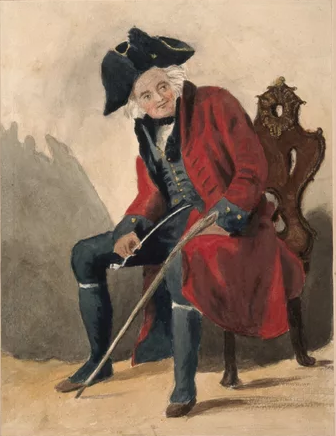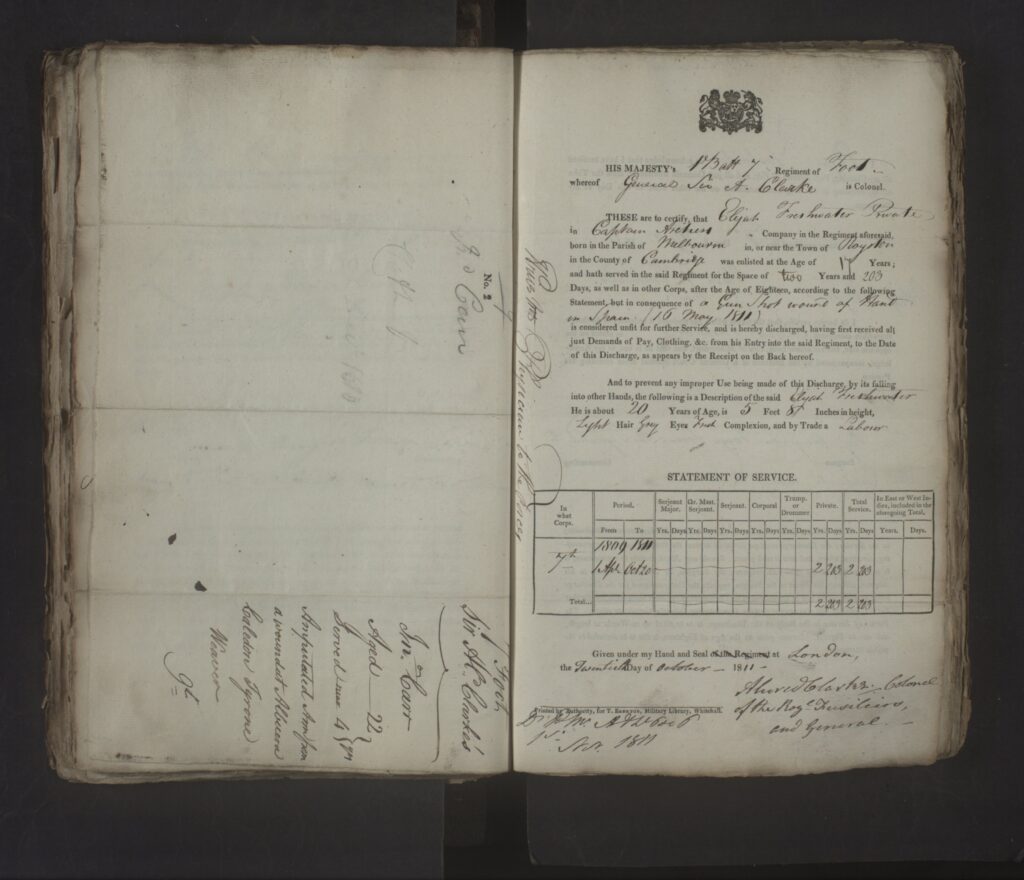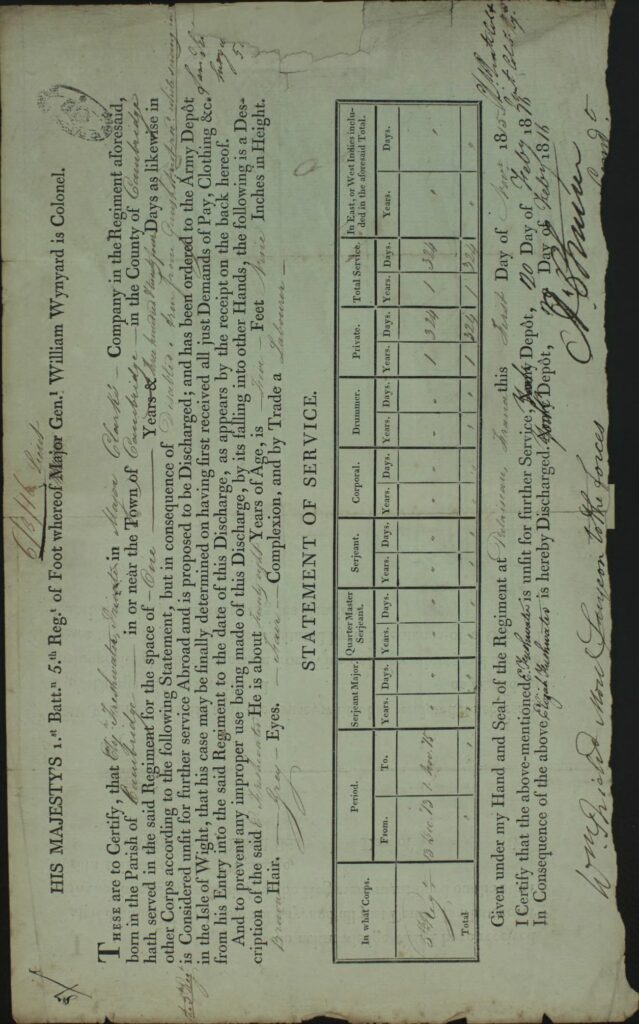Chelsea Pensions Part 1- Elijah Freshwater
In 1681 Charles II issued letters patent notifying of the intention to build “an hospital for the relief of such land soldiers as are, or shall be, old, lame, or infirm in ye service of the crowne”. Thus, in 1682 the Royal Chelsea Hospital, based on the French, Hotel des Invalides located in Paris, was founded.
Prior to the building of the Chelsea Hospital care of wounded soldiers was through religious foundations which were otherwise catering to the elderly and the poor. However, many of these houses had been demolished during the dissolution of the monasteries.
Once the monasteries were no longer providing relief Elizabeth the 1st made the first grant of pensions to the military by statute. There were administered at the local parish level by Justices of the Peace. Every soldier could make a claim on the treasury for either permanent or temporary relief. Pensions of, no more than £20 per annum could be allocated. Soldiers could also seek help at either Ely House or the Savoy were soldiers had been able to receive lodging since 1642.
Originally the Chelsea Hospital was designed outhouse 412 veterans, but even before it was opened there was a realisation that this would not be enough to house all of the soldiers that would need relief. However, in 1692 the Hospital was opened and the first 99 Chelsea pensioners moved into the building.
Residents increased in number very quickly and as funding for the hospital was through deductions from army pay it was not feasible to turn soldiers away if they needed help. As a result, the concept of outpatients came about. Inpatients lived in the Hospital, they received a uniform, their bed and board. When on the grounds, not being formal, the inpatients wore a blue uniform. When undertaking formal activities they wore a red uniform.

A Chelsea Pensioner, seated, wearing a red coat and tricorn hat, holding a pipe and a stick. Watercolour painting. Credit: Wellcome Collection. Attribution 4.0 International (CC BY 4.0)
Out-patients lived elsewhere in the UK, or abroad. These were the most common Chelsea pensioners and certainly the most common in Australia. Chelsea pensioners in places other than the Hospital received a pension that depended upon the nature of their injury and their length of service.
Like with the Greenwich Pension, I have two Chelsea Pensioners, so far located.
Elijah Freshwater
I found Elijah Freshwater’s pension through the 1861 census. In the previous two censuses Elijah had been noted as an Agricultural Labourer, however, in the 1861 census, he was noted as a Chelsea Pensioner. It was obvious that as Elijah aged he was no longer able to supplement his income with agricultural labour and he was now supporting himself and his wife Ann on his Chelsea pension.
From the 1861 census, I was able to find Elijah in the British Army Service Records. Elijah had joined the army at the age of 17 and had been discharged in October of 1811. He had been part of the 7th foot (the Royal Fusiliers) and had never risen above the rank of Private. This lack of mobility for Elijah in the ranks suggests that he didn’t have enough money to buy preferment. Elijah only served for 2 years and 7 months before he received a gunshot wound to the hand in Spain on the 16th of May in 1811.

Based on the above date, and the fact that Elijah served with the 7th Foot, it was possible to determine that Elijah had been injured at the battle of Albuera during the Peninsular war. A mixed contingent of English, Spanish and Portuguese had engaged the French in Albuera, a small village in Spain. This battle was part of the much larger siege of Badajoz which was eventually abandoned by the allied forces.
Elijah, once he received his pension returned to England where he was married and had 6 children.


It sounds as if he was a married in pensioner like my ancestor John Rouse in 1861. The archivist told me that only unmarried/widowed pensioners were admitted but that’s clearly wrong.
Hi Susi,
I think you mean a married in-pensioner, is that correct? I don’t think Elijah was an in-pensioner. According to his marriage certificate he was married in Melbourn, Cambridge. Elijah’s address continued to be Melbourn, Cambridge for the 1841, 1851 and 1861 census and for a trial that he had in 1849 when he was acquitted, but I don’t know what for. Elijah died in Roystone Cambridge, which is right next door to Melbourn, Cambridge. If Elijah was an in-pensioner he would have been listed as living in Chelsea for all of those documents. It is possible that Elijah was in the Chelsea Hospital for a short time after his injury, however, it is just as likely that he recovered on the continent and was then pensioned out and never stayed in the Chelsea Hospital. An injury to his hand would make it unlikely that Elijah would be able to close his hand properly and this would have made him unfit to continue in the armed services.
Many Chelsea out-pensioners did need to collect their pension from Chelsea to retain their pension. It is possible that Elijah needed to go and collect his pension from Chelsea, this would have been a significant journey at that time. However, living where he did it would have been possible for Elijah if he was relying on that pension to support him and his family. Elijah remained an agricultural labourer for the rest of his life. It is unlikely that he would have had the abilities to do much beyond that level of work given the circumstances of the time and an injury that probably would have impacted him for life.